Few people truly enjoy confrontation. For most of us, it’s something so painfully uncomfortable and awkward that we spend most of our waking moments scheming the best ways to avoid it. But the formula for any good narrative adventure embraces it, and The Council thrusts us into a world mirroring our own complex existence.
In some ways, The Council‘s first episode, The Mad Ones, does a fantastic job of filling its confrontations with what feel like real stakes, all while iterating on the traditional design elements found in modern narrative adventures like The Walking Dead, Heavy Rain, and Beyond: Two Souls. Using a unique RPG-inspired system, Big Bad Wolf’s first foray into the genre puffs new life into the drafty house that TellTale built. It’s a game that truly respects player agency — attaching firm, tangible weight to each and every decision.
But in other ways, The Council feels incomplete in its current form. From a sporadic, at times tone-deaf score to unnerving character animations and more we’ll unpack later on, The Council in some ways fails to capture the essential pieces of what so many other genre staples have already perfected. For as much attention as it pays to constructing its interesting story and eerie diegesis, The Council cannot (or perhaps will not) completely confront the demons undermining it.
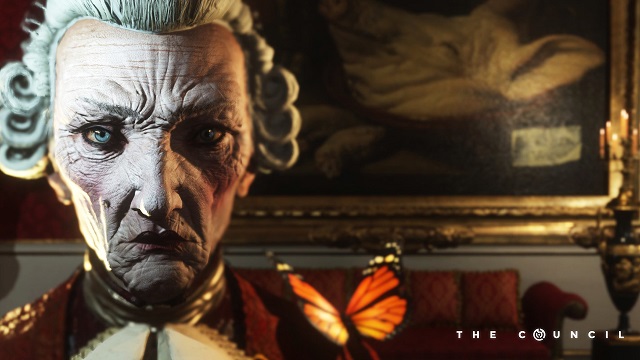
The Council wastes no time thrusting you into delicate and tricky situations. Summoned to a secluded English island by the powerful and mysterious Lord Mortimer, you discover yourself in the very place your mother disappeared only days before. You’re surrounded by the upper echelon of 1790s society, such as a powerful duchess and then president of the United States, George Washington, just to name two.
It’s a strange scene in which to find yourself and requires a bit of suspended disbelief, but The Council doesn’t give you long to dwell on its strange historical conundrums (such as how Washington found time to secret away to the creepy abode of an old English pal for a murder mystery party during his presidency). Instead, it sets you about searching for your mother — and questioning everyone in attendance.
As you set about unfurling the mystery at hand, you’ll find that The Council isn’t your ordinary Twine extravaganza — where you mindlessly choose questions and answers from an ultimately inconsequential dialog tree. Instead, The Council‘s choices instantly feel meaningful, carrying weight with them from the first encounter to the last. And that’s because of the game’s interestingly iterative skill system.
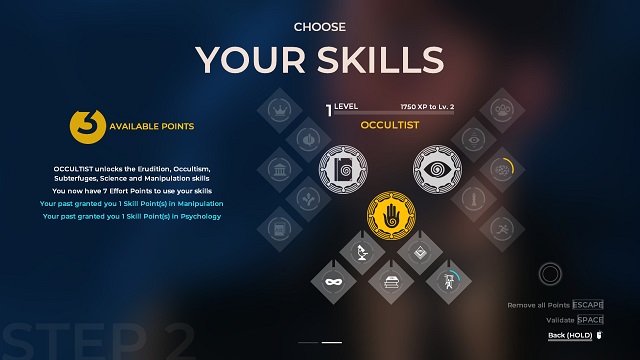
Much like an RPG, The Council has schema dedicated to developing character skills and traits. Through your encounters, you gain skill points for various activities and in-world discoveries. You can then use those points to enhance 15 skills that fall under three main trees: Occultist, Detective, and Diplomat. Each of these overarching masteries provides you with competencies in areas such as logic, etiquette, subterfuge, and manipulation. There are even sub-levels within each of the trees that will help you become more proficient in one area over another.
You use these skills to uncover secrets and win favor. But you also use them in what The Council calls Confrontations. Essentially, these are boss battles that require you to strategically maneuver conversations and situations to come out the victor. Sometimes that means not getting your face smashed in by a rebellious brute, and sometimes it means finally kneading out the final piece of a confounding puzzle.
This system is made more complex by something called Blunders. Essentially, each Confrontation gives you a set amount of poor — or “wrong” — dialog choices. Say the wrong thing too many times, and you lose, potentially missing out on a key piece of information or an important activity that will change the course of the game forever.
On top of all that, you also have what are called Effort Points. For some conversations, activities, and Confrontations, you’ll have the option to exploit character or environmental weaknesses. Depending on the level of the required skill, dialog and/or action choices will show you how many Effort Points it will take to succeed. If you have enough effort points, it’s basically like cheating (hint: you easily succeed). However, if you don’t have enough Effort Points, you can’t use the choice or action at all.
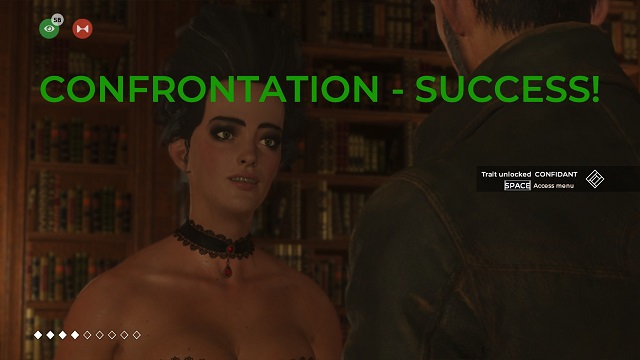
Coupled with more than 30 traits and 45 talents (all of which also have their own unique advantages and disadvantages), it’s a system that adds incredible variety and replay value to The Council. Add to that the fact that each character has their own immunity and vulnerability, and each conversation and confrontation feels exceptionally unique — no matter how many times you experience them.
I will take a moment to admit that it all can be a little daunting from time to time. As my wife watched me play The Council, she remarked how the menu system is a bit on the obtuse side — and I tend to agree.
Even as a seasoned gamer who’s played many, many RPGs, it was a bit tiring trying to remember the criteria for unlocking a certain talent, or what skill did what in which situation, or who said what when and how they said it.
But in the end, I felt that my decisions were really going to matter in the next episode — and that’s a lot more than I can say about many other games in the genre.
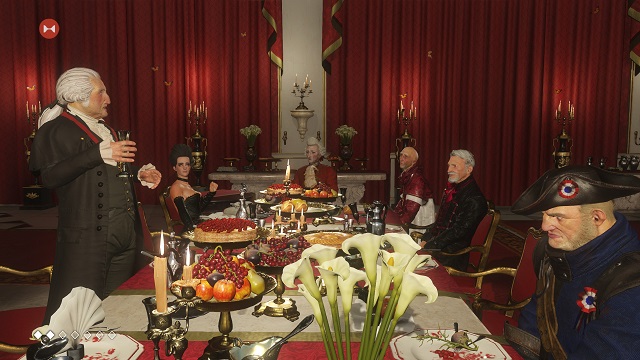
The problem, though, is that for all its intricacies and the additions it brings to an arguably stale genre, The Council has quite a few blemishes that are difficult to overlook. Ostensibly, they’re ones that are painfully difficult to confront considering the potential this game carries on its shoulders.
From sound design and voice work to character animations and a few glaring narrative anachronisms, The Council lacks the polish it deserves. In many ways, it feels meticulously developed and rushed all at once.
In some scenes, the score tumbles over itself, one second delivering foreboding, ominous tones, and in the next, comedic, slapstick timbres reminiscent of a Weird Al record — not a somber tale of mystery. In other scenes, the voice work is inarguably atrocious, specifically for the main character. His ineffectual delivery is only made more prominent by the often pinpoint delivery of other, more believable characters.
And finally, the distracting and sometimes utterly terrifying character animations… From the stills in this review, you’d never know The Council‘s characters carry more terror in a single pixel than Stephen King carries in his entire body. From robotic head tilts to horrifying maws that gnaw at what I can only imagine are invisible bones, there were moments where I couldn’t look away as the horror of it all devoured my soul.
Ok. The disappointing animations aren’t that serious, but for a game that looks so incredibly polished in screens and trailers, it’s disappointing to see such stiff, unnatural movements and facial expressions from these well-designed characters. I know Big Bad Wolf isn’t a major studio, but if any game could have benefited from mo-cap, it was this one.
—
Despite my misgivings about The Council‘s first episode, The Mad Ones, I’m optimistic about its future. It uses good writing to tell a fun, compelling story full of intricate characters. I’m infinitely interested to see where it takes me.
If future episodes are able to iron out some of the rough spots that haunt The Mad Ones, The Council has the potential to be the game that changed the narrative genre forever. If it leaves its awkwardness behind, that’s a confrontation I think it can win.
You can buy The Council on Steam for $29.99.
[Note: The developer provided a copy of The Council for this review].

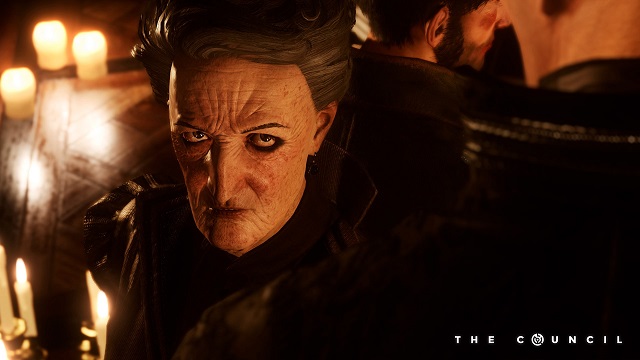





Published: Mar 15, 2018 08:23 pm